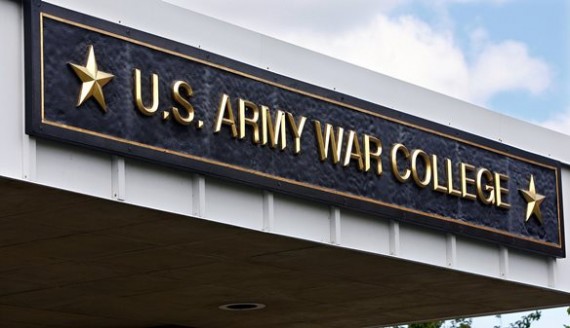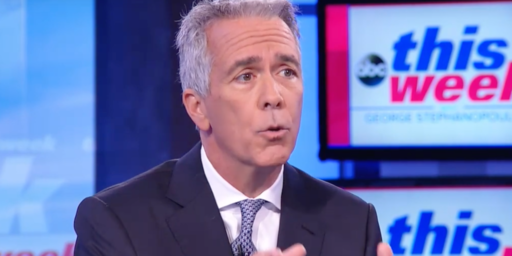In Defense of Professional Military Education
My latest for RealClearDefense: "Senator Walsh's Unrepresentative Black Mark on Professional Military Education"
My latest for RealClearDefense, “Senator Walsh’s Unrepresentative Black Mark on Professional Military Education,” has posted.
The setup:
Not unreasonably, Tufts University professor and Washington Post columnist Dan Drezner has some things to say about Montana Senator John Walsh’s plagiarized masters paper at the Army War College. As his headline puts it, “On what academic planet does a 14 page paper merit John Walsh an M.A.?”
Actually, it’s a bit complicated.
The bottom line is that Professional Military Education, while very much graduate level education, isn’t graduate school. The piece explains how that is and argues that, while there are some issues with PME, the students are definitely earning their master’s degrees.





Good argument, James. I think the “executive MBA” analogy is useful — both for what the degree is and what it isn’t.
You’re right, though, that the real question here is not how the faculty evaluators were OK with 17 pages — it’s how they were willing to give a passing grade to such shoddy thinking presented so poorly.
I have been in a position to read memoranda, reports and investigations from lieutenant colonels, colonels and some GOs over the past few years and I am stunned/alarmed at the poor quality of the writing. On avg, it is at the HS level. The P in PME is being generous. It is formal instruction but it isn’t academically rigorous in any way. If you show up and have a pulse, they will push you through. The avg Army Officer (non USMA) went to a tier 2 or 3 undergrad and graduated w a mediocre GPA. At least that’s been my exp.
HS level is being generous. I am happy if complete sentences are dun used
This is not exclusive to military graduate programs. When I was in graduate school many years ago, probably before you were born, I knew people who paid others to write their thesis for them. Although I did write my own thesis, it was so esoteric I don’t think anyone else could have, I did pay someone to clean up the grammar and English and since that was long before spell checkers the spelling.
James. Don’t forget the guy was getting a full colonel’s salary and benefits while attending the school and writing/plagiarizing. $180000 in pay and benefits should demand a little extra effort and time than most masters programs
You hint at but I think it would pay to say directly that the goals are different. An academic masters is geared to narrow the student’s focus. PME and the EMBA are designed to broaden the student, to pull them from the technical/tactical into strategic/big picture thinking needed for executive leadership.
What Senator Walsh is accused of (plagiarism) is a constant problem in both graduate and undergraduate education these days.
Good writing is not prevalent. I’ve had professors and graduate students tell me that even in upper-division courses at major universities the quality of writing was generally low and about 1/3rd of students were probably in need of remediation. Add to that, students who dare their professors and TAs to detect that they’ve lifted text from obscure journals and publications – and you end up a situation like this. The digital world is making it harder and harder for students to “shoplift” text to pass off as their own.
@President Camacho: You clearly have no idea what “high school level” writing is if you think that. Virtually 100% of field grade officers are high school and college graduates and a large chunk of them have a civilian masters degree. Many of them are in technical fields rather than the humanities of social sciences—which makes sense, given what they do for a living—but my students are generally much better writers than the undergraduates I taught at various schools. Few of them are truly good writers, to be sure, but that’s the case with college graduates and non-writing-intensive graduate programs generally. Hell, as I can attest from more than a decade as an editor, it’s true of a goodly number of people with prestige PhDs and substantial public policy experience. Even most smart, highly educated folks are poor writers.
@James Joyner:
Yes, but virtually 100% of high school graduates don’t write at a high school level. It’s a grade standard, not a descriptive label.
The NY Times and WaPo are written “at an 8th grade level”. How many 9th graders write that well, or with that vocabulary?
I was a college professor once upon a time, in a reasonably reputable engineering school. I was stunned by the poor language skills of my undergraduate students — and they were stunned to lose points for bad grammar and spelling in their project reports. “That’s not fair — this isn’t an English class!”
@DrDaveT: But “written at an 8th grade level” means that the average 8th grader can understand the words in the stories—not that they’re competent to write those stories. Your average Harvard grad isn’t that caliber writer.
@James Joyner: you probably are correct – is this the state of our ed system?
@President Camacho: I’m not sure it was ever different. Kids nowadays learn all manner of complex science very early on that I didn’t get until high school or college. But few are effective writers and they haven’t been since I’ve been reading things produced by undergraduates—going back 22 years now.
I spend a ton of time with field grade officers and general officers. The level of writing from either is pretty shockingly bad. As is the level of thinking, on average,
@James Joyner: of course if you asked me to do a physics problem I would flee in terror. Everyone has their strengths
@Anonomouse: Compared to what baseline?
@President Camacho: You and me both.
@James Joyner:
Compared to well-educated civilians at comparable points in their career. The military appears to be comfortable lying to itself on this issue: there is neither depth nor breadth in PME. It is a sham. The accrediting bodies are shaming themselves by participating in it.
@Anonomouse:
You mean Ivy League and other elite school grads? Attorneys at big time law firms? What?
Because this just isn’t true in my experience. The verbal skills of my majors and lieutenant commanders are on part with their peer cohorts at the DC think tanks. Their writing skills are below that level–but that’s not surprising, given that most of them are STEM majors and don’t do written analysis for a living. They’re smart, accomplished, mid-career professionals. But they’re not academics or lawyers, who specialize in the use of words.
@James Joyner: I’m not a wordsmith by education, and I mostly work with folks *with* engineering and math backgrounds, but “*against*” those from all over the services; and I just comprehensively disagree with your assessment.
Maybe I’m just lucky in my colleagues? I guess?
I might be uncharitable in my assessment of the quality of writing from majors and lcdrs… but I don’t think so, based on the supposed equivalence to ~GS13s.
OTOH, in support of my much meaner claims regarding PME: I have read A LOT of theses from the war colleges, and it is a rare, rare, rare, rare event that I am not appalled at the quality.